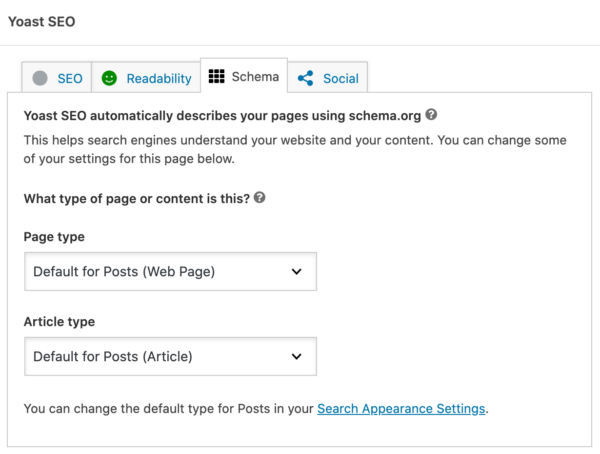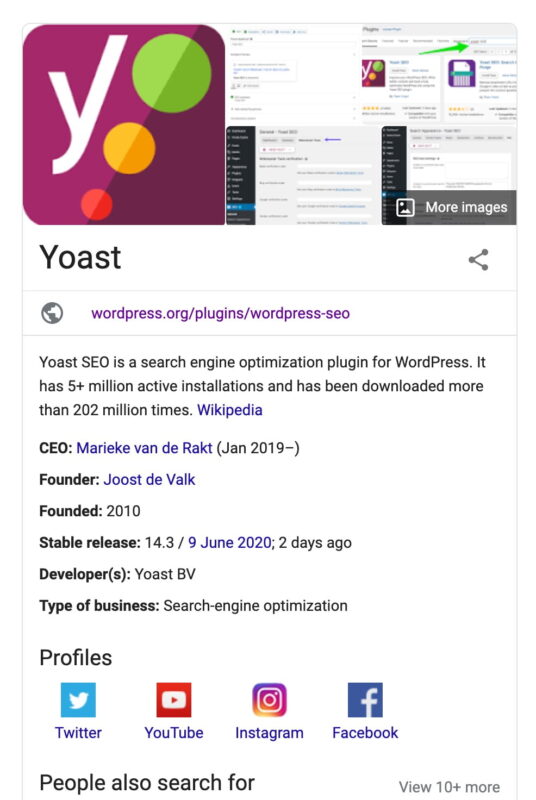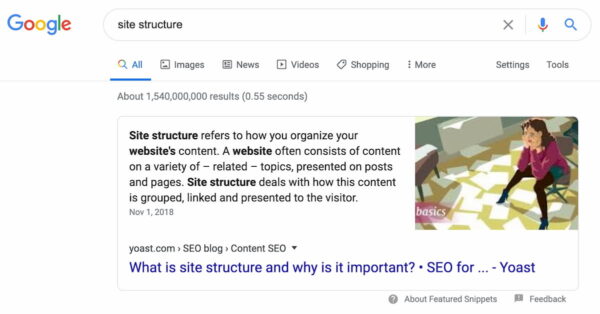Schema.org takes care of all the structured data needs on your website. If you use it to describe products, reviews, events, and recipes, search engines like Google can pick up this data and present your page in an enhanced way. If you want rich results like snippets, interactive mobile results, voice-activated actions or a listing in the knowledge graph, you need to describe your pages with structured data. This ultimate guide is an overview of this wide-ranging topic.
Update: Since the 11.0 release, Yoast SEO builds a full structured data graph for every post or page on your site! A graph is a complete piece of structured data with well-defined connections to all the different parts. Search engines now not only know what all the parts mean but also how they fit together. Want to know what it does for your website? Read all about structured data in Yoast SEO!
What is structured data?
Structured data is a way of describing your website to make it easier for search engines to understand. You need a so-called vocabulary to make it work and the one used by the big search engines is called Schema.org. Schema.org provides a series of tags and properties to describe your products, reviews, local business listings, job postings, etc in detail.
The major search engines, Google, Bing, Yandex, and Yahoo, collectively developed this vocabulary to reach a shared language that allows them to gain a better understanding of websites. Today, search engines use it for a vast amount of things, from fact checking content to COVID-19 alerting!
If implemented correctly, search engines can use the applied structured data to understand the contents of your page better. As a result, your site might be presented better in search results, for example in the form of rich results like rich snippets. However, there are no guarantees you’ll get rich results — that’s up to the search engines.
Why do you need structured data?
Describing up your products, reviews, events, job postings and more with structured data in the Schema.org vocabulary makes your site instantly comprehensible by search engines. This means that they can tell exactly what every part of your site is about. Search engines no longer have to guess that a product listing is a product listing, you can now say it is.
Is structured data important for SEO?
To cut a long story short: yes, structured data in the form of Schema.org is important for your SEO. Correctly implementing data might not give you better rankings, but it will indirectly make your site a better search result.
Enhanced search results give searchers an easier way to pick a result from the list of links. If your listing is rich, and your page does what your listing promises, you are a valid result for the customer and that will lead to a lower bounce rate. A lower bounce rate tells Google that your site is a well-regarded result that promises and delivers.
Also, since structured data is still picking up steam, you have a good chance of getting a head start on your competitors.

Structured data leads to rich results
By describing your site for search engines, you’re allowing them to do interesting things with your content. Schema.org and its support is in constant development, so it is improving and expanding all the time. As structured data forms the basis for a lot of new developments in the SEO world — like voice search –, there are bound to be more in the near future. Below is an overview of the rich search results that are currently available; you can find examples of all in Google’s Search Gallery. At the moment, these are the available rich results:
- Article
- Book
- Breadcrumbs
- Carousel
- Critic review
- Dataset
- Employer aggregate rating
- Event
- Fact check
- FAQ
- How-to
- Image license metadata
- Job posting
- Job training
- Local business
- Logo
- Movie
- Estimated salary
- Podcast
- Product
- Q&A
- Recipe
- Review snippet
- Sitelinks searchbox
- Software app
- Speakable
- Subscription and paywalled content
- Video
The rich results formerly known as rich snippets

Rich results — we’re not supposed to call them rich snippets anymore, according to Google — are the extra pieces of information and interactive features shown on a search result page. In addition to the regular black lines of meta description text, a search result can be enhanced with product information like prices or reviews, or extra navigational tools like breadcrumbs or site search.
Read more: Rich snippets everywhere »
Rich results on mobile

Rich results are even more prevalent on mobile. Search results for certain types of items, like local restaurants, recipes, movies, how-tos and courses, can get special treatment in the mobile results. These are often presented in a touch-friendly, swipeable way also known as the carousel.
Google is incredibly interested in getting you to do as much as you can within these results. So, you can book your flight tickets, reserve a spot in a popular restaurant, order movie tickets and send a tasty looking recipe for cheesecake straight to your Google Home so it can assist you while baking it. Almost everything powered by structured data. And this is only the beginning.
Knowledge Graph
The Knowledge Graph is the big block of information on the right-hand side in Google. This block details different bits of information about a particular search result. Google fills this graph by checking and evaluating related content about this specific subject. One of the source it checks is the structured data of a site.
If you have a validated company or if you are an authority on a certain subject, you might see your name, logo and social media profiles appear.

Featured snippets
OK, so this might be a sneaky addition because featured snippets are rich results, but they do not get their content from structured data. A featured snippet answers a search question directly in the search results, but uses regular content from a web page to do so.

Does structured data work on mobile?
Yes, the results of implementing structured data work everywhere. Mobile is one of the places where the results of a Schema implementation are most visible.
If a page meets the criteria set by Google, you can now book movie tickets or reserve a table at a restaurant directly from the search results. If you implement structured data correctly, you could also be eligible for several interactive extras in the mobile search results pages. In addition, if you add AMP to the equation you can get even more Google approved interactive goodies on mobile.
Different kinds of structured data
If you look at the Schema.org website, you’ll notice that there is a lot of information you could add to your site as structured data. Not everything is relevant, though. Before you start implementing structured data, you need to know what you should markup. Do you have a product in an online store? Do you own a restaurant? Or do you have a local business providing services to the community? Or a site with your favorite cheesecake recipes? Whichever it is, you need to know what you want to do and explore the possibilities. Don’t forget to check the documentation by search engines to understand what they need from you.
Don’t go for the most obscure ones; pick the ones that are relatively easy to implement. Some Schema.orgs appear on less than a thousand sites, but others appear on millions. Lets take a look at a couple of the most important ones:
Creative works
The Creative Work group encompasses all creative things that have been produced by someone or something. You’ll find the most common ones below, but the list is much longer. You’ll also find properties for sculptures, games, conversations, software applications, visual artworks and much more. However, most of these properties don’t have a rich presentation attached to them in search engine results, so they are less valuable. But, as mentioned earlier, if your site has items in the categories below, be sure to mark them up with Schema.org.
Articles
An article could be a news item or part of an investigative report. You can distinguish between a news article, a tech article or even a blog post.
Books
A book is a book, be it in a paper form or in digital form as an eBook. You can markup every type of property, from the author who wrote it to any awards it has won.
Courses
Courses can also appear as a rich result.
Datasets
Google understands structured data for datasets and can use this to help surface and understand these datasets better. Find out more on Google’s developer pages.
FAQ pages
Make a great FAQ page to answer frequently asked questions your customers might have. Yoast SEO helps you turn those FAQs into beautiful rich results in Google with the Schema structured data FAQ content block.
How-tos
Today, can markup your how-to articles with HowTo structured data. In the new WordPress block editor, you’ll find our new and free structured data content block for how-to’s. By following a step-by-step process, users can get a specific task done. At the moment, there’s no rich result attached to this.
Music
Music also gets the structured data treatment. There are a couple of Schema.orgs of interest for music, like MusicRecording, MusicAlbum, MusicEvent and MusicGroup.
Q&A pages
Question and answer pages are eligble for rich results as well. According to Google, Q&A pages are different to FAQ pages where you can find multiple questions and answers on a page. More in Google’s Q&A page documentation. Use the Yoast SEO structured data content blocks to provide structured data for your FAQ pages.
Recipes
By adding Recipe data to the recipes on your cooking website, you can get your recipes featured directly in search results. What’s more, with the advent of mobile rich results, recipes might even be presented in a stunning new way on mobile featuring great images — if you add them. And that’s not all, because you can now send your recipes to Google Home and get Assistant to speak it out loud for you. How cool is that?
Speakable
Google is currently testing the implementation of speakable Schema.org. With this code, you can tell a search engine that a piece of content is especially written to be spoken out loud by digital assistants like Alexa, Siri, Cortana or Google Assistant.
TV & Movies
Movies and TV shows get their own piece of structured data as well. Searching for a movie in search engines will yield a rich result with reviews, poster art, cast information and even the ability to directly order tickets for a showing. You can even mark up lists of the best movies ever made or your favorite TV shows. What’s more, get your visitors to watch the content directly by adding ViewAction or Watch Action structured data.
Videos
It’s possible to do all kinds of interesting things with video. Google, in particular, is working on new ways to display videos in the search results, with AMP for instance. Google can use your videos in AMP carousels and Top Stories listings.
Podcast
Have a podcast? Why not mark up your podcast with structured data so Google can do cool stuff with it, like showing each episodes description and even adding a play button as well.
Commerce
There’s also structured data for commercial goals. Here, you’ll find a couple of important ones:
Events
Marking up your event listings with the correct Event Schema.org, might lead to search engines showing your events directly in the search results. This is a must have if you own a nightclub, a venue or any type of business that regularly puts on events.
Businesses and organizations
If you make money with your website, chances are you own a business. If you’re a site owner or just work on a company site, you’ll find the business and organization Schema.orgs interesting. Almost every site can benefit from the correct business Schema.org. If you do it well, you could get a nice Knowledge Graph or another type of rich listing in the search engines. You can even add special structured data for your contact details so customers can contact you directly from the search results.
Keep reading: Local business listings with Schema.org and JSON-LD »
Job Postings
Have job postings on your site? Mark them up with the job postings structured data to have them show up nicely in Google. We use this on all our Yoast job postings as well.
Products
The Schema.org for products is almost as important as the one for businesses and organizations. Using Product Schema.org you can give your products the extra data search engines need to give you rich snippets, for example. Think about all the search results you see with added information, like pricing, reviews, availability, etc. If you have products, this should be a major part of your structured data strategy. Don’t forget to mark up your product images.
Read on: Rich snippets for product listings with Schema.org »
Reviews
Reviews and ratings play an important role in today’s search process. Businesses, service providers and online stores all use reviews to attract more customers and show how trustworthy their offer is. Getting those five stars in search engines might be the missing link to creating a truly successful business.
Keep on reading: Grow your business with ratings and reviews »
Actions for voice assistants

Voice assistants are all the rage and we will see a lot happen in this space. Take recipes for instance; you can send a recipe from the search results — powered by structured data and AMP — to your Google Home to be read aloud while you are cooking. These are called Actions and there are a whole bunch of them. If you want your recipes to appear in the Google Assistant library you need to add a specific set of structured data and adhere to additional rules. You can find more on that on the Creating a recipe action page. Visit Google’s Assistant site to get a feel for what’s possible (a lot!).
The technical details
To get started with marking up your pages, you need to understand how Schema.org actually works. If you look closely at the full specs on Schema.org, you’ll see there’s a strict hierarchy in the vocabulary. Everything is connected, just like everything is connected on your pages. Scroll through the list to see all the options at a glance and note down the ones you think you need.
Let’s look at the hierarchy. A Schema.org implementation starts with a Thing, this is the most generic type of item. A Thing could be a more specific type of item, for instance, a Creative Work, an Event, Organisation, Person, Place or Product.
For example, a movie is a “Thing” and a “Creative Work”, which falls under the category “Movie”. You can add a lot of properties to this, like a “Description”, a “Director”, an “Actor”, a poster “Image”, “Duration” or “Genre”. There are loads of properties to add, so you can get as specific as you want. However, don’t go overboard, since not every property is used by search engines – at least not yet anyway. What you should do, is look at the specifications in Google’s documentation, for instance, to see which properties are required and which are recommended.
A sample Schema.org hierarchy
If we put what we know now in a hierarchy, this is what you will end up with:
- Thing
- Creative Work
- Movie
- Description (type: text)
- Director (type: person)
- Actor (type: person)
- Image (type: ImageObject or URL)
- etc.
- Movie
- Creative Work
If it would be a local business, you could use something like this:
- Thing
- Organisation (or Place)
- LocalBusiness
- Dentist
- Name
- Address
- Logo
- Review
- etc.
- Dentist
- LocalBusiness
- Organisation (or Place)
For local businesses, you could pick a more specific type of business. This makes it easier for search engines to determine what kind of business you own. There are hundreds of types of local business, but your business might not fit one of the descriptions. Using the Product Types Ontology you can get more specific information if your listing is too broad.
Sticking to the local business example, you’ll see that Google lists several required properties, like the NAP (Name and Phone) details of your business. There are also loads of recommended properties, like a URL, geo-coordinates, opening hours, etc. Try to fill out as much of these as you can, because only then will search engines give you the full presentation you’re looking for. If you need help with your local business markup, you’ll find our Local SEO plugin very helpful.
What do you need to describe for search engines?
Looking at Schema.org for the first time might feel a bit daunting. The list is enormous and the possibilities are endless, so it’s easy to become overwhelmed. To get over this, you need to go back to basics. Think about what your site, business or product is about and write down the specifications and properties you feel are important, then work your way up from there.
Having said that, there are a couple of sections you should prioritize in your plan to add structured data to your site. If you start off with these three, you’ll have the basics covered and then you can build on that. You should absolutely start with structured data for your business details, products, and reviews. These will have the biggest effect in the short term.
How to implement structured data
Don’t be frightened, but here comes the technical part of the story. Actually there’s nothing scary about adding the data to your pages any more thanks to JSON-LD. This JavaScript-based data format makes it much easier to add structured data since it forms a block of code and is no longer embedded in the HTML of your page. This makes it easier to write and maintain, plus it’s better understood by both humans and machines. If you need help implementing JSON-LD structured data you can enroll in our structured data course or follow a high-level course on Google’s Codelabs.
Structured data with JSON-LD
JSON-LD is the preferred method of adding structured data to your site. However, not all search engines have been quick to adopt it — Bing being the last hold-out. Thankfully, Microsoft came round in August 2018 and now supports this, which is the most efficient method.
For Yoast SEO 11.0 we’ve completely rewritten our Schema.org implementation. Yoast SEO now creates a structured data graph for every page on your site, interconnecting everything. While working on this, we’ve also created complete and detailed documentation on Schema, including a specification for integrating structured data. Here you’ll also find some example graphs for various kind of common pages on your site.
If you want to learn more about working with all this on your site, you should read Michiel’s article on how to use JSON-LD to add Schema.org data to your website, Annelieke’s article on adding structured data to your site with Google Tag Manager or learn how to add structured data with <a href="https://yoast.com/academy/structured-data-training/">our training on structured data and SEO</a>, part of our Yoast SEO academy training subscription.
The old ways: RFDa and Microdata
The classic way of writing structured data for inclusion on your pages involves directly embedding it into your HTML. This made a really inefficient and error-prone process and is much of the reason why the uptake of Schema.org hasn’t been particularly fast. Writing and maintaining it via RFDa or Microdata is a pain. Believe us, try to do as much as you can in JSON-LD.
Microdata needs itemprops to function, so everything has to be inline coded. You can instantly see how that makes it hard to read, write and edit.
Structured data and Google AMP
The open source AMP project (Accelerated Mobile Pages) has been causing quite a stir. The project’s goal is to get pages to load lightning fast on mobile using a special kind of HTML. Google is pushing AMP pretty hard and also mentions its reliance on structured data. If you want particular rich results you might have to use AMP and add that specific structured data.
Tools for working with structured data
Yoast SEO handles a lot structured data for you in the background. You could extend our Schema framework of course — see the next chapter –, but if adding code by hand seems scary, you could try some of the tools listed below. If you are still not sure how to go about this, ask your web developer for help. They will probably fix this for you in a couple of minutes.
- Generators
- Validators and test tools
- WordPress Plugins
- Yoast SEO Local (Our Local SEO plugin adds Schema.org for your business details, like address, geo-location, opening hours, etc.)
- The Yoast SEO WooCommerce plugin outputs product Schema to get your products highlighted in search.
- Yoast SEO uses JSON-LD to add Schema.org information about your site search, your site name, your logo, images, articles, social profiles and a lot more to your web pages. We ask you if your site represents a person or an organization and adapt our structured data based on that. Also, our structured data content blocks for the WordPress block editor make it easy to add structured data to your FAQs and How-to’s.
The Yoast SEO Schema structured data framework
Implementing structured data has never been really easy. Also, the results of the majority of those implementation were often lacking. At Yoast, we set out to enhance the Schema output by millions of sites. For this, we built a Schema framework — ready to be adapted and extended by anyone. One of the things we did, is combine all those loose little bits and pieces of structured data that appear on many sites, improve these and put them in a graph. By interconnecting all these bits, we offer search engines all your connections on a silver platter.

Of course, there’s a lot more to it. We can also extend the output of Yoast SEO by adding in specific pieces of Schema, like how-tos or FAQ. For this, we built structured data content blocks for use in the WordPress block editor. Together, these help you take away barriers for search engines and for users alike — as it has never been easier to work with structured data.
Read the Yoast SEO Schema documentation to if you want to learn how Yoast SEO works with structured data, how you can extend it via an API and how you can integrate it in your own work.
External links
Most search engines have their own developer center where you can find more information on the inner workings of their structured data implementations. Read these to see what works and what doesn’t. You should stick to their rules, because a bad Schema.org implementation could lead to a penalty. Always check your code in the structured data test tool to see if it’s correct. Fix errors and regularly maintain the code on your site to see if it is still up to scratch.
- Google’s Introduction to Structured Data
- Bing’s Marking Up Your Site with Structured Data
- Yandex’ Schema.org for Webmasters
In the end
You can’t run away from structured data anymore. If your site means anything to you, you should look into it and figure out the best way to make use of Schema.org. Implemented correctly, it can do great things for your site, now and in the future. Search engines are constantly developing new ways to present search results and more often than not they use Schema.org data to do it.
Read more: WordPress SEO: The definitive guide to higher rankings for WordPress sites »
The post Structured data with Schema.org: the ultimate guide appeared first on Yoast.


Recent Comments